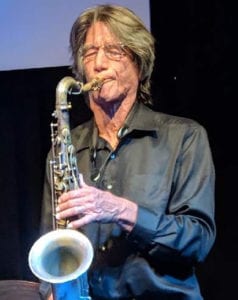February 5, 2020 | By Bernie Freydberg
with Akiko Kotani
. . .

Recently and quite innocently, my wife and I went to The Studio@620 in St. Petersburg to hear some jazz. I expected a good evening featuring a conventional trio or quartet. However, nothing could have prepared me for what I heard. David Pate on tenor saxophone (and other reeds), with his long time bassist Michael Ross, dazzled us all with some of the most beautiful and challenging music I have ever heard.
The history of jazz lives in Pate’s horn. Yet his music is entirely original. He creatively transforms that history with every phrase.
Sam Rivers, who played a major role in the post-war post-bop avant-garde movement, was the first inspiration for Pate’s approach. One can also hear inflections of such pioneers as Ornette Coleman, John Coltrane, Miles Davis, Charles Mingus, Eric Dolphy, Wayne Shorter, Pharoah Sanders, Don Cherry, Ron Carter and others.
However, knowledge of jazz history is not required to take pleasure in his music, and to understand it.
It’s a long way in many ways from late 20th century Lower Manhattan to 21st Century Tampa Bay. Pate had a respected place in the loft scene in New York City in the 1980s, where much of serious jazz evolved.
When I asked him why he left this scene for Clearwater, where he was born and now lives, his surprising answer told me a lot about the kind of person he is. Back then, he took his young son for a walk all the way up 5th Avenue in order to share the sights with him. At its conclusion, he noticed that the boy, who was clean at the outset of the walk, was dirty at its end. Then and there, he decided to move to a place where he could raise his children in a more suitable environment. One might call it more wholesome.
David Pate’s creative art is not “wholesome.” His extraordinary technique is in service to blinding epiphanies of sound that soar to unexpected heights just as they plumb the darkest depths. His music demands attention, which it rewards thoroughly and generously.
In the two hours that Pate played, we did not hear a single cliché, nor was a single measure repeated. Those of us fortunate enough to be present could only marvel at the journey that his art conferred upon us. He has played alongside Rivers, alongside Pharoah Sanders, and was a leading member of the Bogus Pomp band. Bogus Pomp was one of the few to be granted permission by the Frank Zappa estate to play the latter’s complex orchestral music. He also played beside more mainstream trumpeter and bandleader Nat Adderley.
Two local groups provide a place where Pate exercises his unique orientation — the Clinic and Liquid Bebop. The Clinic consists of winds, bass, drums and theramin. It devotes itself to pure improvisation.
Bassist Michael Ross led Liquid Bebop. It fashioned programs featuring a single composer. One of their concerts was all Ornette Coleman compositions. Another showcased Charles Mingus. Yet another featured Thelonious Monk.
The musical mixture of audacity and reverence of Liquid Bebop was strikingly present in its interpretation of Monk’s “I Mean You,” which that master pianist played and recorded on many occasions.
There was no piano in Liquid Bebop’s version, only two tenor saxophones — Pate’s was one — bass (Michael Ross) and drums.
Pate has toured with The Temptations, and will be a member of their accompanying band when they visit St. Petersburg this month.
As recently as July 2019, Pate’s contributions to American jazz as a teacher were celebrated in a Palladium Theater concert. Having done graduate work at the Manhattan School of Music and taught for 35 years at the Pinellas County Center for the Arts (PCCA) at Gibbs High School, Pate mentored scores of musicians who became successful professionals. Of these, many were on hand for the Palladium concert.
He explained that he “focused on the kid, not the music.” By this, he meant the student’s individuality is paramount.
Pate carried the spirit of the free jazz movement to which he still belongs into his pedagogy, encouraging his charges to discover their own distinct voices. The more traditional elements of music were introduced afterward. All the while, students listened to the recorded legacy of jazz.
David Pate has been called everything from “ a remarkable force of nature” to “the greatest {expletive} saxophone player on earth.” Further, he is a great friend to our community who graciously shares his gift with us in many ways.
There is no need to try to recapture the jazz greats on recorded devices. Just be sure to catch the next time David Pate performs right here in the Tampa Bay area.
You can hear David Pate’s solo sax improvisation here
You can watch the Bogus Pomp Orchestra
performing at The Palladium Theater in 2015


